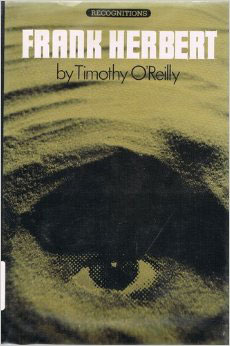Frank Herbert

Preface
If you say, “I understand”… you have made a value judgement.
—Whipping Star
The highest praise that can be given to an author is to say that his work awakens unexpected possibilities of thought and feeling. I have written about Frank Herbert from this perspective. His work has touched me, and I have learned from him.
To my mind, the most fundamental judgment to be made about a novel is not as a work of art built to abstract standards, but as an act of communication. What does it say to the reader? How does it touch him?
The job of a book like this is not to criticize but to illuminate and intensify an author's statement, chiefly by juxtaposing a wider range of material than would be apparent to a casual reader. The juxtaposition here includes material from all of Herbert's work—his essays, letters, poetry, and short stories, as well as his novels—and from extensive personal interviews with him.
Such an illumination is particularly appropriate with the Dune trilogy, since it is many-layered and its imaginative span is too great to be grasped all at once. The impact of the story is felt, but its meaning is not always understood.
One criticism that I have made of Herbert throughout this book is that he walks a narrow line between entertainment and didacticism. In his best work, such as Dune, the story itself is the message; the concepts are so completely a part of the imaginative world he has created that the issue of didacticism never arises. Ideas are there to be found by the thoughtful reader, but one never stumbles over them. Other works, however, are sometimes unnecessarily obscure. Herbert's shorter novels in particular lack the development of story and character to support the weight of the ideas they contain.
Even so, these shorter novels well repay detailed study. I have found that the more I know about Herbert's work as a whole, the more I am able to enjoy works such as Destination: Void and The Eyes of Heisenberg. Close reading strips away the obscurity, allowing the excitement of what Herbert is trying to say to become the source of the reader's enjoyment.
One word about the mechanics of this book: notes for all references follow the end of the text and are identified by page number and a few words from the relevant passage. No superscript numbers appear in the text. This format is intended to enhance the readability of this study while retaining the full critical apparatus.
A few words of gratitude are also in order. Thanks first of all to Frank Herbert himself, for all the obvious reasons; to Beverly Herbert, for some invaluable perspectives and for the final word on chronology and other factual information; to Ralph Slattery, Jack Vance, and Poul Anderson for sharing their memories; to Albert Lord, for his perspectives on folklore elements in Dune; to Ted Jennings and especially Will McNelly, whose willingness to share their own ideas and unpublished interview material showed me the best traditions of scholarship.
Thanks also to Walt Blum at the San Francisco Examiner, who went out of his way to help me track down articles and friends Herbert had developed there; to Mrs. John W. Campbell for permission to excerpt portions of her husband's letters to Herbert; to Linda Herman of the Special Collections Library at the California State University at Fullerton, for her unfailing help in my, search through the Herbert manuscripts and other papers kept there; to Marty Cohen and Lynne Conlon, each of whom did legwork for me when time kept me from following up important leads; to my business partner, Peter Brajer, for biding his time while I finished this book; and to the MIT Science Fiction Society, whose pooled knowledge and complete collection of science-fiction magazines were so reassuringly close at hand.
Finally, thanks to my wife Chris, for her valuable comments and suggestions, and to Dick Riley, my editor, for his patience, his appreciation, and his thoughtful pruning.